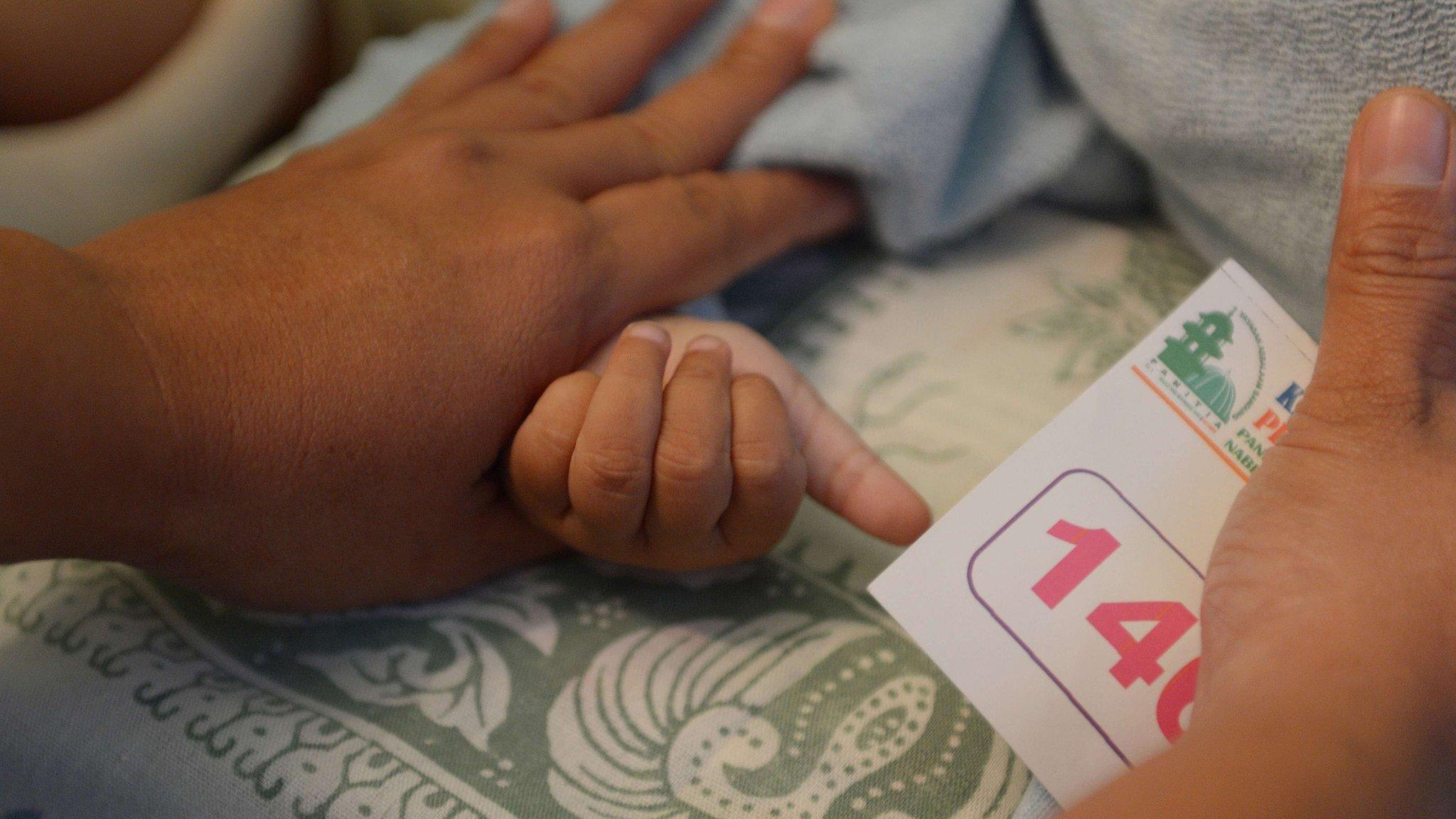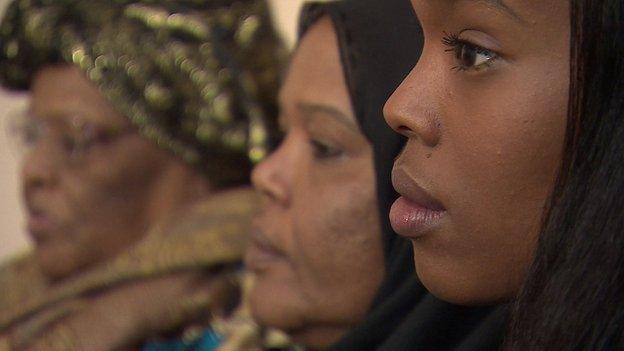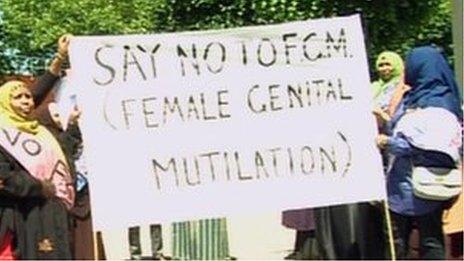Failure to stop FGM is a 'national scandal', say MPs
- Published
Sarian Kamara is determined her daughter will not be subjected to female genital mutilation, as Naomi Grimley reports
The failure to tackle female genital mutilation (FGM) is a "national scandal" with as many as 170,000 victims in the UK, MPs have said.
Failures by ministers, police and other agencies have led to the "preventable mutilation of thousands of girls", the Home Affairs Committee said.
It blamed a "misplaced concern for cultural sensitivities" for inaction, and called for a national action plan.
The government said it was working to end "this terrible form of abuse".
The report, external called for greater anonymity for victims and protection orders to prevent girls from being taken abroad.

Female genital mutilation
Includes "the partial or total removal of the female external genitalia or other injury to the female genital organs for non-medical reasons"
Practised in 29 countries in Africa and some countries in Asia and the Middle East
An estimated three million girls and women worldwide are at risk each year
About 125 million victims estimated to be living with the consequences
It is commonly carried out on young girls, often between infancy and the age of 15
Often motivated by beliefs about what is considered proper sexual behaviour, to prepare a girl or woman for adulthood and marriage and to ensure "pure femininity"
Dangers include severe bleeding, problems urinating, infections, infertility and increased risk of newborn deaths in childbirth
In December 2012, the UN General Assembly approved a resolution calling for all member states to ban the practice

An estimated 65,000 girls under the age of 13 in the UK are at risk from FGM, the report said.
The practice has been illegal in Britain since 1985, but the first prosecutions - which are currently ongoing - were not until this year.
In France, however, "a large number of successful prosecutions has played a key role in discouraging the practice", the committee said.
The report said the police and Crown Prosecution Service had "historically been far too passive in their approach by waiting for survivors to come forward and report".
The MPs called for prosecutions to show the issue was being taken seriously in the UK and the implementation of a "comprehensive and fully-resourced" national action plan for dealing with it.
The record of healthcare professionals in referring cases to the authorities was described as "extremely poor". The committee said many in the education sector still needed to "overcome awkwardness" if they feared schoolgirls may be at risk, while the Association of Chief Police Officers had shown "a distinct lack of leadership", it said.

Analysis
Naomi Grimley, BBC News

MPs are the first to admit that FGM is an issue "surrounded in silence". Victims don't necessarily want to talk about what has happened to them and they might be even more reluctant to inform on parents.
One answer MPs have come up with is giving women the right to anonymity in court. This already exists for rape victims under the Sexual Offences Act 1992. The Home Affairs Committee says that law should be amended to cover women with FGM too.
Another suggestion from MPs is to make more use of protection orders whereby vulnerable girls are placed under the wing of the courts.
These are already in use for suspected cases of forced marriage - indeed 600 have been activated in that capacity. These might stop families taking girls overseas for illegal procedures as well as ensuring regular medical checks for the most "at risk" cases.

While anecdotal evidence suggested it was common for girls to be taken back to their country of origin during the school holidays to undergo the procedure, there was also evidence of FGM taking place in the UK, the report said.
Court protection orders - similar to the system used for suspected victims of forced marriage - were one of the committee's recommendations.
In line with practice in France, medical professionals should be able to make FGM assessments on girls thought to be at risk, the committee said.
'Act now'
If all else fails, the MPs called for it to be made an offence not to report child abuse.
Committee chairman Keith Vaz said: "FGM is an ongoing national scandal which is likely to have resulted in the preventable mutilation of thousands of girls to whom the state owed a duty of care.
"Successive governments, politicians, the police, health, education and social care sectors should all share responsibility for the failure in recent years to respond adequately to the growing prevalence of FGM in the UK. We need to act immediately.
"It is unacceptable that those with clear access to evidence of these crimes do nothing to help those at risk."
Masai proponents of FGM insist girls who are not cut are "dirty"
Crime prevention minister Norman Baker said the government was "already driving a step-change to end this extremely harmful and misguided practice".
"Earlier this year, ministers from across government signed a declaration to demonstrate their commitment to end this terrible form of abuse. We are working with religious and community leaders to forge a commitment to condemn FGM, and reaching out to communities to encourage them to seek help and advice and ultimately abandon the practice," he said.
He said the government was also working to protect foreign nationals in the UK who are taken overseas for FGM to be carried out.
Dr Comfort Momoh, a public health specialist at St Thomas's Hospital, in London, told BBC Radio 4's Today programme there was a "lack of training" and a "lack of awareness" around the issue among health professionals.
She said: "If our so-called professionals don't have the knowledge, if our so-called professionals don't know how to identify groups who might be at risk, how do we expect the community to report cases to us?"
Prime Minister David Cameron is to host the UK's first Girl Summit, aimed at ending FGM within a generation, this summer, he said.
- Published19 March 2014

- Published5 February 2014

- Published16 April 2014

- Published4 June 2014
